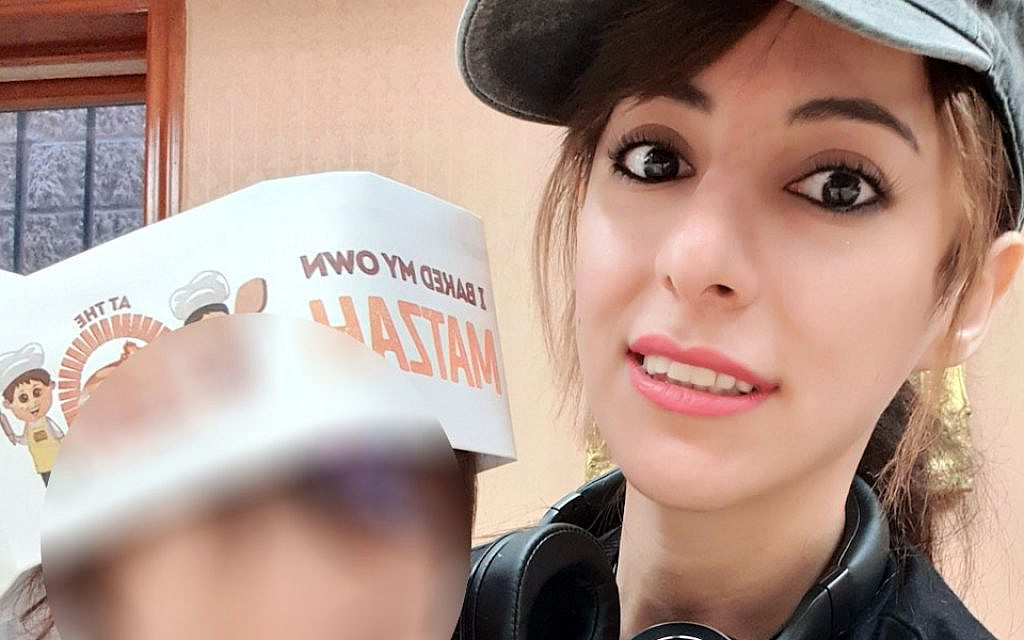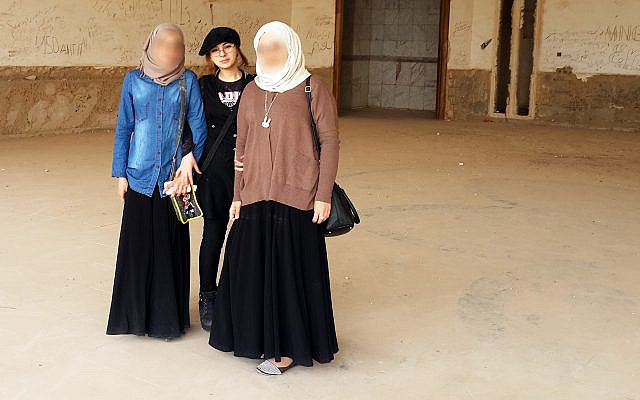Ceen Gabbai survived 2003 invasion, received asylum in US; in home country, family had to move 5 times due to anti-Semitism, but her Muslim friends secretly recorded ‘Hatikvah’

NEW YORK (JTA) — When Ceen Gabbai argued with her first-grade teacher about the Palestinian-Israeli conflict, she didn’t realize how big of a risk she was taking.
The year was 2000 and students across the world held strong opinions about the Second Intifada, an outbreak of violence that claimed thousands of lives and began in September of that year. But Gabbai’s situation was different: She was one of the few Jewish students in Saddam Hussein’s Iraq. Standing up for Israel in a Baghdad elementary school was not an advisable move.
“Saddam was all crazy about Palestine,” she told the Jewish Telegraphic Agency. “I go to school and they’re talking about what a horrible thing that is and how Israel was horrible. And I go and I’m like, ‘I think that’s a lie.’”
Gabbai was called to the school office, took a letter home to her mother and her parents had a meeting with the principal. Soon after they moved homes and she switched schools. Following the episode, her parents did not talk with her about Israel or Judaism.
Gabbai has had a dangerous life. Born a Jew under an Iraqi dictatorship, she endured constant anti-Semitism from a young age, then survived the American invasion of Iraq in 2003 and the years of war that followed.
In 2015, Gabbai received asylum in the United States. She is now living in an Orthodox neighborhood in Brooklyn, raising a child, teaching elementary school and writing children’s literature. She does not look back fondly on the hardships she endured, but feels they taught her to persevere no matter the situation.
“I was born as an Arab Jew for a reason: to take this thing — the fact that I’m an Arab Jew — and make the best out of it and be good at it,” she said. “That’s what I do, be good at things that I’m in.”
The Jewish community in Iraq dates to the time of the Talmud, whose principal edition originated in study halls in what then was known as Babylon. Jews held prominent positions in government and business until the 1930s, and there were some 150,000 Jews in Iraq before the State of Israel was established in 1948.
But conditions deteriorated in 1941, when Iraqis attacked their Jewish neighbors in what is called the Farhud, a two-day pogrom in which some 180 Jews were killed. By the early 1950s, most Iraqi Jews had left in an Israeli mass-emigration operation.
“There’s a huge amount of nostalgia from Muslims and Christians in those countries for the joint life that Jews and non-Jews shared in Arab countries,” said Elhanan Miller, a rabbinical student who interviewed Gabbai for a series he’s conducting with Jews from the Arab world. “[For Jews], it’s a mix of nostalgia and a lot of hurt.”
Gabbai said that though Iraqis purport to be opposed to Zionism but tolerant of Jews, she never felt accepted for who she was. Teachers would give her a hard time in class despite her good grades. One even gave her a copy of “Mein Kampf,” Adolf Hitler’s manifesto.
“It was hard being Jewish because I felt like, if you’re Jewish, you don’t really have anywhere to belong to,” she said. “Wherever you go, people ask you to leave. If you’re in the Middle East, people ask you to leave. In America, you have anti-Semitism. Wherever you go, people ask you to leave.”
Gabbai’s family hid their Judaism from friends and neighbors, letting others believe they were Christian or agnostic. When her peers did find out, they would mock her. While Gabbai was growing up, the family had to move five times because of anti-Semitic harassment.
“I was always saying, give me a chance to do something bad and then hate me,” she said. “I would be OK about that, but don’t just hate me for no reason. … It was about me personally, about something I don’t have a say in.”
There were bright spots. Gabbai was scared of telling one of her close friends, a devout Muslim, that she was Jewish. But when she did, the friend accepted her, and the two remain close (though Gabbai never revealed her religion to her friend’s parents). And soon before Gabbai left, her friends recorded themselves in private singing “Hatikvah,” Israel’s national anthem, as a way of telling her they loved her.
“I felt comfort in that because I knew they’re not using me as propaganda,” she said. “They’re not being like, ‘Hey, we’re friends with a Jew, we’re OK with a Jew.’ No, they were OK with me being Jewish, with me belonging to Israel in one way or another. So they did something for me. The fact that it was dangerous made it even more beautiful.”

Along with anti-Semitism, Gabbai had to deal with another danger while growing up: the Iraq War. She has a string of terrified memories from that time: huddling with her grandmother and family in a basement during the American invasion, coming to school one day to find the building bombed out, and riding a taxi with her father as a bomb blew up right in front of them.
“I don’t really remember much about that day,” she said. “I remember the glass from the window in the car all breaking, and I remember there was blood coming out of my dad’s head, and I think he fainted.”
As the war raged, Gabbai managed to get a bachelor’s degree in law at age 19, the youngest in her class. Soon after, she was given asylum in the United States with the help of HIAS, an American Jewish refugee aid group. She now lives amid Brooklyn’s Syrian Jewish community and loves seeing the things she missed out on — big, happy Jewish families hanging out freely with their neighbors and cousins.
After coping with so much in Iraq, she said the move has not been so hard on her . She said a number of Americans have apologized to her for the Iraq War.
“I think it was OK for the most part,” she said of her move.”I learned how to adapt with change. Change wasn’t a shock for me.”
Gabbai now teaches fourth grade and is a published children’s book author. Her work focuses on upending stereotypes.
In one of her stories, a girl becomes a knight, but instead of slaying a dragon, she realizes the dragon is nice and befriends it.
“If the world tells you you’re bad and you’re wrong, maybe the world is wrong,” she said. “Maybe you’re not the wrong one, maybe they’re the wrong ones. Maybe you should be proud of who you are.”
As reported by The Times of Israel
